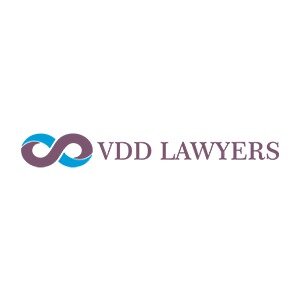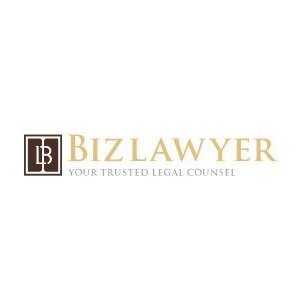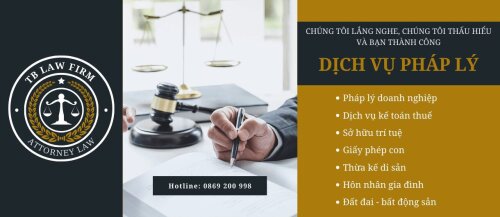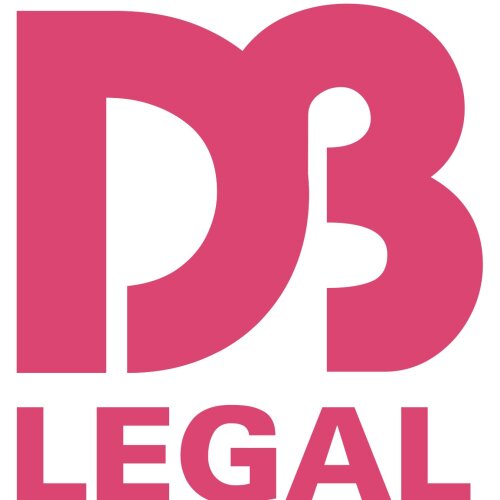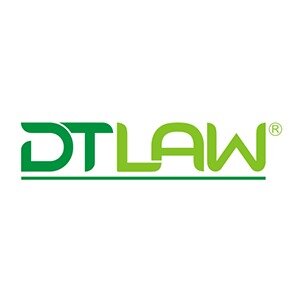Best Real Estate Lawyers in Vietnam
Share your needs with us, get contacted by law firms.
Free. Takes 2 min.
Free Guide to Hiring a Real Estate Lawyer
Or refine your search by selecting a city:
List of the best lawyers in Vietnam
Vietnam Real Estate Legal Questions answered by Lawyers
Browse our 1 legal question about Real Estate in Vietnam and read the lawyer answers, or ask your own questions for free.
- Illegal Eviction
- May I please request legal representation. Location, Da Nang
-
Lawyer answer by Law Plus
Dear Client, Thank you for reaching out to LawPlus regarding your request for legal representation in Da Nang. To better assist you, could you please provide us with more details about the matter you need support with? It would also...
Read full answer
Vietnam Real Estate Legal Articles
Browse our 2 legal articles about Real Estate in Vietnam written by expert lawyers.
- Buying an Apartment in Vietnam? New 5% Deposit Cap
- From August 2024, the new Law on Real Estate Business in Vietnam caps any pre-contract deposit for off-plan homes at 5% of the selling price until you sign the Sale & Purchase Agreement (SPA). Developers can no longer legally demand large "reservation", "capital contribution", or "investment cooperation" payments before the... Read more →
- Overseas Vietnamese Land Ownership in Vietnam: A Guide
- From 1 January 2025, Viet Kieu who hold a valid Vietnamese passport have land use rights in Vietnam on the same basis as domestic citizens, under the 2024 Land Law. Viet Kieu with Vietnamese nationality can now buy land plots and landed houses (with land use rights), not only apartments... Read more →
About Real Estate Law in Vietnam
Real estate law in Vietnam has seen significant development over the past few decades as the country has opened up to both domestic and foreign investment. The regulatory framework governing land use rights, property transactions, and real estate development has evolved to facilitate economic growth while balancing state control over land, which is a public asset in Vietnam. The legal system primarily draws from the Land Law, Housing Law, and other related statutes which guide real estate transactions and ownership.
Why You May Need a Lawyer
There are several situations where legal assistance might be necessary when dealing with real estate in Vietnam:
- Clarification of property ownership rights, especially for foreigners or overseas Vietnamese.
- Understanding land use rights and navigating the complexities of leasing, transferring, or mortgaging land.
- Assistance with contract negotiation and drafting for property sale, purchase, or lease.
- Resolving disputes related to boundaries, ownership, or property development.
- Compliance with local regulations regarding property development and construction.
- Navigating investment regulations if involved in large-scale real estate projects.
Local Laws Overview
In Vietnam, the following aspects of local laws are particularly relevant to real estate:
- Ownership Structure: Vietnamese law recognizes land-use rights, not absolute land ownership, as all land is collectively owned by the people under the state’s management.
- Foreign Ownership: Foreign individuals and organizations are subject to specific conditions and limitations in owning real estate, particularly concerning land compared to housing.
- Land Use Rights: These are crucial as they dictate how land can be used and transferred. Rights are usually granted for a fixed term and can include rights to mortgage, lease, inherit, or donate.
- Real Estate Transactions: The laws require contract formalities like notarization for legal real estate transactions, and certain conditions must be met for contracts to be valid and enforceable.
- Taxes and Fees: Transactions involving real estate are subject to various taxes and fees, such as registration fees, value-added tax, and personal income tax on gains from property transfer.
Frequently Asked Questions
Can foreigners buy property in Vietnam?
Foreigners can purchase property in Vietnam, but they face limitations, particularly with land, where they are often only granted lease terms. Condominiums and certain housing types are more accessible for foreign buyers.
What are land-use rights?
Land-use rights in Vietnam allow individuals or entities to use land for a specified purpose under a lease arrangement from the state, as direct ownership does not apply.
How are real estate transactions secured?
Transactions are secured through notarized contracts, registration with the relevant authorities, and adherence to state regulations regarding the transfer or lease of land-use rights.
What taxes are applicable to property transactions?
The major taxes include value-added tax (VAT), registration fees, and personal income tax on any capital gains derived from property transactions.
What is the process for transferring land-use rights?
This process involves an agreement verified by a public notary, payment of applicable taxes, and official registration with the land registry office to complete the transfer of rights.
What legal documents are needed for buying property?
Buyers typically need identification papers, proof of eligible transaction funds, and a notarized sales agreement to proceed with a purchase.
How long is the real estate buying process in Vietnam?
The process can vary but typically takes several weeks, allowing time for document preparation, contract review, and obtaining necessary approvals.
Can I lease my property if I am not a resident in Vietnam?
Property owners, regardless of residency status, can lease their property, subject to compliance with legal obligations such as taxation and lease registration.
Are there special zones for real estate investment in Vietnam?
Yes, Vietnam has special zones for investment, often offering favorable conditions and incentives for foreign investors, especially in industrial or economic zones.
What should I check before purchasing real estate in Vietnam?
Verify the property's legal status, ownership history, compliance with zoning regulations, any outstanding debts or legal disputes, and ensure all contracts are properly drafted and notarized.
Additional Resources
Here are some resources and organizations that can assist with real estate matters in Vietnam:
- Vietnam's Ministry of Natural Resources and Environment: Oversees land management and environmental policy.
- Vietnam National Real Estate Association (VNREA): Provides information and support for real estate stakeholders.
- General Department of Taxation: For guidance on taxes related to property transactions.
- Local Land Registration Offices: Essential for the registration of land-use rights and property transactions.
Next Steps
If you need legal assistance in real estate, consider the following actions:
- Consult with a local law firm specializing in real estate to understand your rights and obligations.
- Seek recommendations for experienced real estate attorneys from business associations or expatriate networks.
- Visit the relevant governmental offices for information or clarifications on specific procedures and requirements.
- Stay informed about local regulations and market conditions to make well-informed decisions.
Lawzana helps you find the best lawyers and law firms in Vietnam through a curated and pre-screened list of qualified legal professionals. Our platform offers rankings and detailed profiles of attorneys and law firms, allowing you to compare based on practice areas, including Real Estate, experience, and client feedback.
Each profile includes a description of the firm's areas of practice, client reviews, team members and partners, year of establishment, spoken languages, office locations, contact information, social media presence, and any published articles or resources. Most firms on our platform speak English and are experienced in both local and international legal matters.
Get a quote from top-rated law firms in Vietnam — quickly, securely, and without unnecessary hassle.
Disclaimer:
The information provided on this page is for general informational purposes only and does not constitute legal advice. While we strive to ensure the accuracy and relevance of the content, legal information may change over time, and interpretations of the law can vary. You should always consult with a qualified legal professional for advice specific to your situation.
We disclaim all liability for actions taken or not taken based on the content of this page. If you believe any information is incorrect or outdated, please contact us, and we will review and update it where appropriate.
Browse real estate law firms by service in Vietnam
Vietnam Attorneys in related practice areas.
Browse real estate law firms by city in Vietnam
Refine your search by selecting a city.






